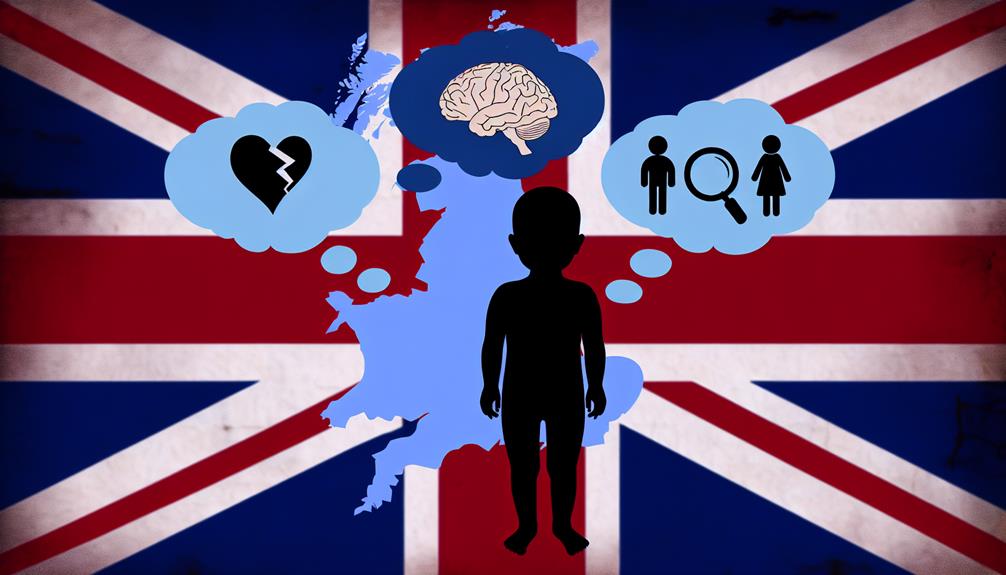Kids' mental health in UK foster care is shaped by several factors. To begin with, foster care policies and caregiver training directly influences their mental state. Next, they face emotional challenges leading to attachment issues. Providing a supportive environment with understanding and empathy, greatly helps. Therapy, like cognition behavioural, plays an important role in addressing these issues. To conclude, improvements in the foster care system, including extensive support networks are crucial. If you're up for digging deeper, there's plenty more insightful information to keep you informed about this intricate topic.
Key Takeaways
- Foster care policies in the UK directly impact a child's mental health, with the quality of personal interaction playing a significant role.
- Emotional challenges for foster children, like abandonment and insecurity, often lead to mental health issues and behavioral problems.
- Foster parents can aid in reducing mental health stigma and contribute to creating a supportive environment for the child.
- Therapeutic interventions, such as Cognitive Behavioral Therapy, have proven effective in addressing mental health issues in foster children.
- Improvement strategies include extensive foster parent training, policy reforms for mental health services, and collaboration among stakeholders.
Understanding the Foster Care Environment

Often, understanding the intricacies of the foster care environment can greatly help in assessing its impact on a child's mental health. Let's explore this critical aspect, specifically focusing on 'Foster Care Policies' and 'Caregiver Training'.
You're aware that Foster Care Policies aren't just rules on paper, they shape the environment a child is nurtured in. They determine not only the duration of stay, but also the quality of personal interaction and emotional support the child receives. Hence, you'll find that policies directly influence a child's mental health, either positively or negatively.
Next, you can't overlook the significance of Caregiver Training. Caregivers are the child's first line of defense against mental health issues, and their training plays a crucial role. You may wonder, 'What should caregiver training involve?' It should ideally equip them with the skills to provide emotional support, identify early signs of mental distress, and connect with the child on a deeper level.
You see, the foster care environment is a complex network of policies and people. By understanding its intricacies, you're better equipped to comprehend its effect on a child's mental health.
Emotional Challenges for Foster Children
Wandering through the maze of emotions can be particularly challenging for foster children, as they grapple with feelings of abandonment, fear, and insecurity regularly. These emotional trials can cause significant attachment issues and behavioural problems, making it increasingly difficult for them to form stable, trusting relationships.
Understanding these emotions isn't a walk in the park. Foster children often struggle with forming healthy attachments due to their past experiences. They may resist forming new bonds, fearing further abandonment or disappointment. This may manifest as behavioural problems, such as acting out or withdrawing from social interactions.
It's important to note that every child is unique and will react differently to these challenges. Some children may become anxious or depressed, while others might exhibit aggressive behaviour. Recognising these signs is essential for providing the right support and intervention.
The Impact on Childrens Mental Health

Taking into consideration these emotional challenges, it's easy to see how they can greatly impact a foster child's mental health. The absence of a stable environment, coupled with possible trauma experiences, can lead to emotional and behavioral issues.
The influence of a foster parent can't be underestimated. It can either aid in stigma reduction or contribute to the child's mental health issues. When foster parents create a supportive, understanding environment, it fosters resilience and aids in stigma reduction. However, if they reinforce negative stereotypes and fail to provide emotional support, it can exacerbate a child's mental health problems.
| Parental Influence | Impact on Child's Mental Health |
|---|---|
| Supportive Environment | Decrease in mental health issues |
| Understanding and Empathy | Increase in resilience |
| Reinforcing Negative Stereotypes | Increase in mental health issues |
Therapeutic Interventions in Foster Care
Understanding the vast array of therapeutic interventions available in foster care is essential for ensuring the emotional wellbeing and resilience of these vulnerable children. Your role as a caregiver is crucial in facilitating these interventions. With proper training, you can make a significant difference in a child's life.
Let's discuss intervention effectiveness. Cognitive Behavioural Therapy (CBT), for instance, is a front-runner due to its efficacy in treating a range of mental health issues. It helps children understand their thoughts and feelings, and how these influence their behaviour. Play therapy is another intervention that proves effective, especially for younger children. It uses play to communicate with and help children resolve their issues.
Caregiver training, on the other hand, equips you with the knowledge and skills to better respond to the child's needs. By understanding the child's trauma and learning effective communication techniques, you can provide a nurturing environment that fosters healing and growth. Additionally, training helps you identify signs of mental health issues early on, enabling prompt intervention.
Strategies for Improvement in Foster Care

To enhance the foster care experience and outcomes for children, it's crucial for you to implement effective strategies that cater to their unique needs and circumstances. One such approach is training foster parents extensively, equipping them with skills to comprehend and tackle the mental health issues prevalent among foster children. Trained parents can provide nurturing, supportive environments, crucial for these children's emotional well-being.
Policy reforms also play a crucial role in improving foster care. It's vital to advocate for policies that prioritize mental health services for foster children, guaranteeing they receive the attention they deserve. This could involve revisions in funding allocations or legislative changes to prioritize mental health in the foster care system.
Additionally, fostering collaborations between social workers, psychologists, and foster parents can create a comprehensive support network for the child. Regular check-ins and updates can make certain the child's needs are met and issues addressed promptly.
Frequently Asked Questions
What Is the Average Duration of a Child's Stay in UK Foster Care?
You're curious about UK foster care stay lengths. On average, a child's stay lasts about two years. This period can impact trauma and resilience building, both vital aspects of their mental health journey.
How Does the UK Foster Care System Compare to Those in Other Countries?
Traversing foster care systems is like exploring a global labyrinth. UK's system shines in innovation, yet international comparisons reveal varied approaches. You'll find each country's system unique, reflecting their cultural, social and legal nuances.
What Are the Specific Qualifications Required for Someone to Become a Foster Parent in the Uk?
You'll need to complete specific Foster Training Programs and undergo a Parenting Skill Assessment. These are designed to guarantee you have the necessary understanding and abilities to provide a safe, nurturing environment for foster children.
Are There Any Financial Resources or Support Available for Foster Parents in the Uk?
Yes, in the UK, foster parents gain access to Foster Benefits, including weekly allowances, tax exemptions, and training. You're also supported by networks providing advice, respite care, and emotional support. It's a all-inclusive package.
What Is the Process for a Child to Be Adopted From the Foster Care System in the Uk?
You'll face adoption challenges in the UK foster care system. After a thorough assessment, they'll match you with a child. Post adoption support's available to help navigate the intricacies of your new family dynamics.
Conclusion
You may argue that foster care is a temporary solution, but the impact on children's mental health can be lasting. Let's not overlook the emotional challenges these kids face.
With the right therapeutic interventions and improved strategies, we can create a more nurturing foster care environment. Remember, your understanding and empathy can make a huge difference.
These kids deserve the best possible support for their mental health. Let's make it happen.




